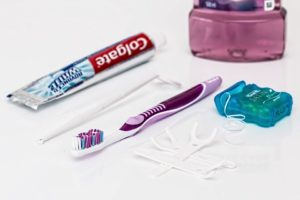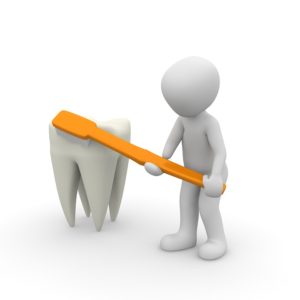Dentist in Bel Air
Your mouth contains hundreds of bacteria. Before you reach for the toothbrush and mouthwash, understand that not all bacteria are bad. Here’s what you need to know about the bacteria that makes its home in your mouth.
Bacteria Basics
More than 700 different oral bacteria species have been detected. Most people usually have less than 10% of these different strains in their mouth at one time. Different strains have different purposes. Bacteria that are harmless and help digest food are known as probiotics. Other types of bacteria help keep your teeth and gums healthy. The troublemakers are those that contribute to decay and periodontal disease.
The Dangers of Bacteria
Bacteria constantly grow and multiply in your mouth. According to Registered Dental Hygienist Magazine, certain bacteria species can double their population in 20 minutes if conditions are right. They feed on starches and sugars that are the byproduct of the food and drinks you consume throughout the day. Certain bacteria types produce an acid while they feed. This acid erodes your tooth enamel, leaving your teeth susceptible to decay.
Maintain a Healthy Mouth
The best way to manage the bacteria in your mouth is to maintain excellent oral hygiene. Brushing at least twice each day for two full minutes and flossing regularly is the best way to keep bacteria in check. You may want to consider an antibacterial mouthwash. Another key element to maintaining optimal oral health is sticking to a healthy diet. By avoiding or cutting back on foods and drinks that contain high amounts of sugars, acids, and starches, you can reduce the multiplication of bacteria that feed on these byproducts.
Not all bacteria are out to harm your teeth. Bacteria can be incredibly helpful in maintaining your overall heath. To help protect your mouth and teeth against the bad bacteria strains, keep following your oral hygiene routine. During your next visit to our office, we will provide a thorough cleaning and check for decay. We will also screen for any signs of other oral diseases.
For more information on keeping your mouth healthy, please contact our team.

 If you are on a vegetarian or vegan diet, it is important that you are aware of the impact these diets can have on your teeth and overall oral health. While there are numerous benefits of following a vegetarian or vegan lifestyle, your teeth depend on certain nutrients to remain strong and healthy. Vegetarians and vegans might be missing some key nutrients by avoiding certain foods. Here’s what you need to know.
If you are on a vegetarian or vegan diet, it is important that you are aware of the impact these diets can have on your teeth and overall oral health. While there are numerous benefits of following a vegetarian or vegan lifestyle, your teeth depend on certain nutrients to remain strong and healthy. Vegetarians and vegans might be missing some key nutrients by avoiding certain foods. Here’s what you need to know. Even a healthy mouth is lined with bacteria. Normally, your daily oral hygiene routine helps prevent oral health complications. However, it is possible to develop an excess of bacteria and fungi, which can leading to additional problems. Here’s what you should know about oral thrush and what you can do to prevent it.
Even a healthy mouth is lined with bacteria. Normally, your daily oral hygiene routine helps prevent oral health complications. However, it is possible to develop an excess of bacteria and fungi, which can leading to additional problems. Here’s what you should know about oral thrush and what you can do to prevent it. minations and treatment are important for you, too. Did you know according to the Academy of General Dentistry (AGD), by age 72 men lose an average of 5 teeth? That number jumps to 12 if you are also a smoker. Here’s what you need to know about keeping your mouth healthy. Follow these tips and you can beat the odds stacked against men and their oral health.
minations and treatment are important for you, too. Did you know according to the Academy of General Dentistry (AGD), by age 72 men lose an average of 5 teeth? That number jumps to 12 if you are also a smoker. Here’s what you need to know about keeping your mouth healthy. Follow these tips and you can beat the odds stacked against men and their oral health. It seems like there is a new headline nearly every week featuring someone who swears their teeth are whiter and brighter due to their natural home remedy for stain removal. These articles showcase the idea that whitening can be cheap and easy, if in some cases unpleasant. It can be tempting to consider trying for brighter, whiter teeth without investing time and money on in-office or at-home whitening under a dentist’s care. However, before you pin your hopes on one of these “natural whitening” methods, take a look at the truth behind some of the recent fads.
It seems like there is a new headline nearly every week featuring someone who swears their teeth are whiter and brighter due to their natural home remedy for stain removal. These articles showcase the idea that whitening can be cheap and easy, if in some cases unpleasant. It can be tempting to consider trying for brighter, whiter teeth without investing time and money on in-office or at-home whitening under a dentist’s care. However, before you pin your hopes on one of these “natural whitening” methods, take a look at the truth behind some of the recent fads. Wisdom teeth are the last new teeth that will enter your mouth. Most patients have some form of complications resulting from their wisdom teeth. Did you know that your wisdom teeth can impact your overall health? Here’s what you need to be aware of regarding your wisdom teeth.
Wisdom teeth are the last new teeth that will enter your mouth. Most patients have some form of complications resulting from their wisdom teeth. Did you know that your wisdom teeth can impact your overall health? Here’s what you need to be aware of regarding your wisdom teeth.